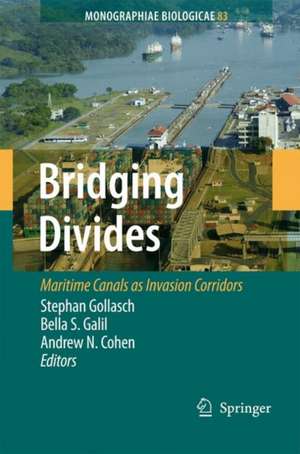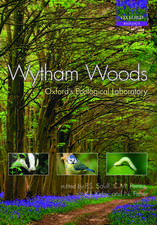Bridging Divides: Maritime Canals as Invasion Corridors: Monographiae Biologicae, cartea 83
Editat de Stephan Gollasch, Bella S. Galil, Andrew N. Cohenen Limba Engleză Hardback – 28 sep 2006
This book is the first to assess the impacts of the world’s three principal maritime canals – the Kiel, the Panama, the Suez – as invasion corridors for alien biota. These three canals differ in their hydrological regimes, the types of biotas they connect, and in their permeability to invasions.
Dr. Stephan Gollasch was involved in the first European ship sampling programme on ballast water, tank sediments and ship hull fouling (1992-1996). His PhD is world-wide the first thesis based on ballast water sampling. In addition to laboratory and desk studies he spent more than 125 days at sea during several biological surveys and joint ships on their voyages through the Kiel and Suez Canals. Due to the international aspect of biological invasions Dr. Gollasch became a member of several international working groups: International Council for the Exploration of the Sea (ICES); International Maritime Organization (IMO), and the Baltic Marine Biologists (BMB). As an independent consultant he is today involved projects related to biological invasions (e.g. ballast water treatment, ship sampling, risk assessment). Recently he was involved in the development of risk assessments and ballast water management scenarios for the European Atlantic coast, North, Baltic, Caspian and Mediterranean Seas.
Dr. Bella Galil is a Senior Research Scientist at the National Institute of Oceanography, Israel. Her main research interests are the anthropogenic changes occurring in the Levantine marine biota, and the impact of alien species on the Mediterraneanecosystem. She has conducted numerous studies and surveys off the Israeli coast monitoring the benthic biota from the intertidal to the bathyal. She co-chairs the scientific committee of marine ecosystems of the International Commission for Scientific Exploration of the Mediterranean (CIESM), and is a member of the Invasive Species Scientific Committee, IUCN. Galil published over 130 papers in scientific journals and co-edited a volume of the "CIESM Atlas of Exotic species in the Mediterranean". Recently she coordinated the drafting of Guidelines for controlling the vectors of introduction into the Mediterranean of non-indigenous species and invasive marine species for the UNEP Mediterranean Action Plan Regional Activity Centre for Specially Protected Areas RAC/SPA.
Dr. Andrew Cohen is the Director of the Biological Invasions Program at the San Francisco Estuary Institute in Oakland, California. His research has focused on the extent, impacts and vectors of aquatic invasions. He has organized and led rapid assessment surveys for exotic marine species in various localities including one at both ends of the Panama Canal. He helped write California's first ballast water law in 1999, and recently helped develop ballast water discharge standards for the state that seem likely to be enacted this year. He also drafted a petition from the research community that led to a U.S. ban on importing the "Killer Seaweed" Caulerpa taxifolia, and provided technical assistance to a recently successful lawsuit that will force ballast water discharges into U.S. waters to be regulated as biological pollutants under the U.S. Clean Water Act. For his work he has received a Pew Marine Conservation Fellowship and the San Francisco BayKeeper's Environmental Achievement Award.
| Toate formatele și edițiile | Preț | Express |
|---|---|---|
| Paperback (1) | 946.24 lei 6-8 săpt. | |
| SPRINGER NETHERLANDS – 22 noi 2010 | 946.24 lei 6-8 săpt. | |
| Hardback (1) | 954.93 lei 6-8 săpt. | |
| SPRINGER NETHERLANDS – 28 sep 2006 | 954.93 lei 6-8 săpt. |
Din seria Monographiae Biologicae
- 24%
 Preț: 2612.51 lei
Preț: 2612.51 lei - 18%
 Preț: 948.92 lei
Preț: 948.92 lei - 15%
 Preț: 648.74 lei
Preț: 648.74 lei -
 Preț: 397.59 lei
Preț: 397.59 lei - 28%
 Preț: 91.90 lei
Preț: 91.90 lei -
 Preț: 379.86 lei
Preț: 379.86 lei -
 Preț: 388.34 lei
Preț: 388.34 lei -
 Preț: 414.91 lei
Preț: 414.91 lei -
 Preț: 395.47 lei
Preț: 395.47 lei -
 Preț: 389.49 lei
Preț: 389.49 lei -
 Preț: 401.24 lei
Preț: 401.24 lei -
 Preț: 394.71 lei
Preț: 394.71 lei -
 Preț: 405.99 lei
Preț: 405.99 lei -
 Preț: 425.84 lei
Preț: 425.84 lei -
 Preț: 381.21 lei
Preț: 381.21 lei -
 Preț: 389.56 lei
Preț: 389.56 lei - 18%
 Preț: 1833.65 lei
Preț: 1833.65 lei - 18%
 Preț: 1230.35 lei
Preț: 1230.35 lei - 18%
 Preț: 1027.08 lei
Preț: 1027.08 lei -
 Preț: 399.67 lei
Preț: 399.67 lei - 18%
 Preț: 2493.72 lei
Preț: 2493.72 lei -
 Preț: 417.59 lei
Preț: 417.59 lei -
 Preț: 404.89 lei
Preț: 404.89 lei - 20%
 Preț: 557.46 lei
Preț: 557.46 lei -
 Preț: 418.76 lei
Preț: 418.76 lei -
 Preț: 408.37 lei
Preț: 408.37 lei - 15%
 Preț: 650.69 lei
Preț: 650.69 lei - 15%
 Preț: 652.31 lei
Preț: 652.31 lei -
 Preț: 395.37 lei
Preț: 395.37 lei - 18%
 Preț: 1232.26 lei
Preț: 1232.26 lei - 15%
 Preț: 637.59 lei
Preț: 637.59 lei - 18%
 Preț: 1231.95 lei
Preț: 1231.95 lei - 18%
 Preț: 1226.90 lei
Preț: 1226.90 lei - 15%
 Preț: 658.22 lei
Preț: 658.22 lei -
 Preț: 353.75 lei
Preț: 353.75 lei - 18%
 Preț: 1224.36 lei
Preț: 1224.36 lei -
 Preț: 386.22 lei
Preț: 386.22 lei - 20%
 Preț: 723.22 lei
Preț: 723.22 lei - 15%
 Preț: 652.49 lei
Preț: 652.49 lei - 18%
 Preț: 1228.62 lei
Preț: 1228.62 lei - 18%
 Preț: 945.30 lei
Preț: 945.30 lei - 18%
 Preț: 1231.64 lei
Preț: 1231.64 lei - 15%
 Preț: 633.68 lei
Preț: 633.68 lei - 20%
 Preț: 572.09 lei
Preț: 572.09 lei - 18%
 Preț: 1844.54 lei
Preț: 1844.54 lei -
 Preț: 386.61 lei
Preț: 386.61 lei
Preț: 954.93 lei
Preț vechi: 1164.56 lei
-18% Nou
Puncte Express: 1432
Preț estimativ în valută:
182.75€ • 190.09$ • 150.87£
182.75€ • 190.09$ • 150.87£
Carte tipărită la comandă
Livrare economică 14-28 aprilie
Preluare comenzi: 021 569.72.76
Specificații
ISBN-13: 9781402050466
ISBN-10: 1402050461
Pagini: 336
Ilustrații: XIV, 316 p.
Dimensiuni: 210 x 297 x 23 mm
Greutate: 0.72 kg
Ediția:2006
Editura: SPRINGER NETHERLANDS
Colecția Springer
Seria Monographiae Biologicae
Locul publicării:Dordrecht, Netherlands
ISBN-10: 1402050461
Pagini: 336
Ilustrații: XIV, 316 p.
Dimensiuni: 210 x 297 x 23 mm
Greutate: 0.72 kg
Ediția:2006
Editura: SPRINGER NETHERLANDS
Colecția Springer
Seria Monographiae Biologicae
Locul publicării:Dordrecht, Netherlands
Public țintă
ResearchCuprins
Overall Introduction.- Overall Introduction.- The Kiel Canal.- The World's Busiest Man-made Waterway and Biological Invasions.- The Panama Canal.- Chapter I Cutting a Canal Through Central America.- Chapter II Shipping Patterns Associated with the Panama Canal: Effects on Biotic Exchange?.- Chapter III Species Introductions and the Panama Canal.- The Suez Canal.- The Marine Caravan – The Suez Canal and the Erythrean Invasion.- Epilogue.- Canals, Invasion Corridors and Introductions.
Notă biografică
Dr. Stephan Gollasch was involved in the first European ship sampling programme on ballast water, tank sediments and ship hull fouling (1992-1996). His PhD is world-wide the first thesis based on ballast water sampling. In addition to laboratory and desk studies he spent more than 125 days at sea during several biological surveys and joint ships on their voyages through the Kiel and Suez Canals. Due to the international aspect of biological invasions Dr. Gollasch became a member of several international working groups: International Council for the Exploration of the Sea (ICES); International Maritime Organization (IMO), and the Baltic Marine Biologists (BMB). As an independent consultant he is today involved projects related to biological invasions (e.g. ballast water treatment, ship sampling, risk assessment). Recently he was involved in the development of risk assessments and ballast water management scenarios for the European Atlantic coast, North, Baltic, Caspian and Mediterranean Seas.
Dr. Bella Galil is a Senior Research Scientist at the National Institute of Oceanography, Israel. Her main research interests are the anthropogenic changes occurring in the Levantine marine biota, and the impact of alien species on the Mediterranean ecosystem. She has conducted numerous studies and surveys off the Israeli coast monitoring the benthic biota from the intertidal to the bathyal. She co-chairs the scientific committee of marine ecosystems of the International Commission for Scientific Exploration of the Mediterranean (CIESM), and is a member of the Invasive Species Scientific Committee, IUCN. Galil published over 130 papers in scientific journals and co-edited a volume of the "CIESM Atlas of Exotic species in the Mediterranean". Recently she coordinated the drafting of Guidelines for controlling the vectors of introduction into the Mediterranean of non-indigenous species and invasive marine species for the UNEP Mediterranean Action Plan Regional Activity Centre for Specially Protected Areas RAC/SPA.
Dr. Andrew Cohen is the Director of the Biological Invasions Program at the San Francisco Estuary Institute in Oakland, California. His research has focused on the extent, impacts and vectors of aquatic invasions. He has organized and led rapid assessment surveys for exotic marine species in various localities including one at both ends of the Panama Canal. He helped write California's first ballast water law in 1999, and recently helped develop ballast water discharge standards for the state that seem likely to be enacted this year. He also drafted a petition from the research community that led to a U.S. ban on importing the "Killer Seaweed" Caulerpa taxifolia, and provided technical assistance to a recently successful lawsuit that will force ballast water discharges into U.S. waters to be regulated as biological pollutants under the U.S. Clean Water Act. For his work he has received a Pew Marine Conservation Fellowship and the San Francisco BayKeeper's Environmental Achievement Award.
Dr. Bella Galil is a Senior Research Scientist at the National Institute of Oceanography, Israel. Her main research interests are the anthropogenic changes occurring in the Levantine marine biota, and the impact of alien species on the Mediterranean ecosystem. She has conducted numerous studies and surveys off the Israeli coast monitoring the benthic biota from the intertidal to the bathyal. She co-chairs the scientific committee of marine ecosystems of the International Commission for Scientific Exploration of the Mediterranean (CIESM), and is a member of the Invasive Species Scientific Committee, IUCN. Galil published over 130 papers in scientific journals and co-edited a volume of the "CIESM Atlas of Exotic species in the Mediterranean". Recently she coordinated the drafting of Guidelines for controlling the vectors of introduction into the Mediterranean of non-indigenous species and invasive marine species for the UNEP Mediterranean Action Plan Regional Activity Centre for Specially Protected Areas RAC/SPA.
Dr. Andrew Cohen is the Director of the Biological Invasions Program at the San Francisco Estuary Institute in Oakland, California. His research has focused on the extent, impacts and vectors of aquatic invasions. He has organized and led rapid assessment surveys for exotic marine species in various localities including one at both ends of the Panama Canal. He helped write California's first ballast water law in 1999, and recently helped develop ballast water discharge standards for the state that seem likely to be enacted this year. He also drafted a petition from the research community that led to a U.S. ban on importing the "Killer Seaweed" Caulerpa taxifolia, and provided technical assistance to a recently successful lawsuit that will force ballast water discharges into U.S. waters to be regulated as biological pollutants under the U.S. Clean Water Act. For his work he has received a Pew Marine Conservation Fellowship and the San Francisco BayKeeper's Environmental Achievement Award.
Caracteristici
The first to compare the impacts of the three principal maritime canals – Kiel, Panama, Suez – as invasion corridor for alien biota Featuring the functioning of canals in the spread of species, the reduction of species migration barrier, the impact of canals on shipping and the biogeography of the canals









